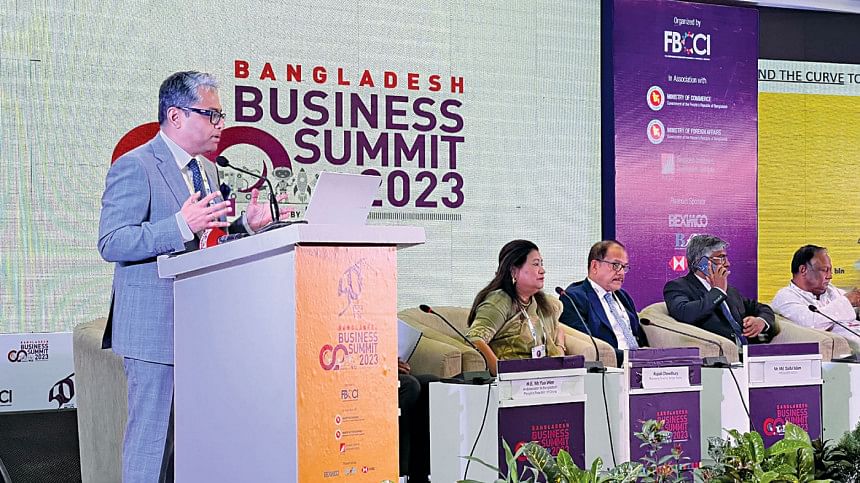Growth and sustainability during the economic transformation of Bangladesh

Despite global economic concerns and severe crises in regional peer economies like Pakistan and Sri Lanka, the economy of Bangladesh is recently getting more positive attention from the global economic community, including investors and media. The majority among them are optimistic about the future of Bangladesh and that is reflected in Bangladesh Business Summit 2023 discussions, which the apex trade organisation of Bangladesh, the Federation of Bangladesh Chambers of Commerce & Industries (FBCCI) organised as a part of their Golden Jubilee Celebration.
The summit not only focused on Bangladesh's economic achievements and investment opportunities, rather other critical factors for a transforming economy with a trillion-dollar GDP ambition such as digitalisation, skill development, empowerment and sustainability were also highlighted. After the formal inauguration and global media sessions with CNN, the second and third day of the summit featured discussions on issues that will be critical for business growth such as SME development, Circularity, Women Empowerment, Export Diversification etc.
"Economic development is not only export development. An advanced income country will have more consumers with more purchasing power so a strong internal consumption demand for value-added products will be created. As we have a large population base that is relatively untapped, the country will be a very attractive market for consumer goods, food, pharmaceuticals, lifestyle products and services. This will demand market-fit innovation, digitalisation of channels and affordable solutions. For example, we will see famous international brands like Vaseline launching market-fit innovations like Mosquito Defense Lotion or Dominos Pizza introducing Kala Buna Pizza frequently," panelists remarked during a session on Consumer Goods.
However, the anticipated business growth will also bring in new challenges so the ecosystem would require intervention and the regulatory structure needs to be updated. "We saw more and more companies are focusing on sustainability not solely to meet legal requirements, but also because this is something that is essential for long-term business growth. That is a quality that the global companies are looking to invest in or collaborate with," said Dr. Md. Shahjuddin, the keynote speaker of the panel on Circularity. These sessions provided quality insights on real local problems that will intensify in the coming days such as plastic waste management. Panelists remarked that post-consumption plastic waste, especially flexible packaging waste, makes up a good portion of the overall plastic waste generated within any economy and ends up in landfills. "Plastic enables businesses to empower consumers by providing affordability. Plastic is not the problem, waste management is the challenge. One single company or organisation alone can never solve this problem, but through effective collaboration, participation and public waste behavior change together can solve this," remarked Ms. Shamima Akhter, a panelist on Circularity session.
The Bangladesh Business Summit 2023 also featured an exhibition as 'Best of Bangladesh' exhibition. The exhibition saw trade bodies and organisations showcasing their innovations and capabilities to attract investors. Many of the organisations focused on demonstrating innovations that were unique. However, some organisations choose to highlight their sustainability and economic impact to attract attention. Companies such as Unilever Bangladesh Limited (UBL), the Sustainability Partner for the event, showcased their sustainable approach and innovations to reduce their carbon footprint and community development. UBL collaborated with the municipalities to explore a solution that focuses on municipal plastic waste management.
"To craft a solution to the plastic waste problem, we must ensure that the value chain is circular and all the actors of the value chain are empowered. You can never solve the plastic problem if the waste collectors or the waste traders are not empowered. We need to assess the situation first to identify gaps, collaborate with the right stakeholders before jumping into intervention. Otherwise the loop will not close and initiatives will be project-dependent, not long-term. Philanthropy will only give short-term results. For example, investing to aware children and change their behaviour is far more effective investment compared to just giving soap or toothpaste to schools as donations," said Mr. Zaved Akhtar, Managing Director and Chief Executive Officer of Unilever Bangladesh, who informed that the company has already collected and processed 44% of their annual plastic footprint in Bangladesh last year and is aiming to be completely plastic neutral by 2024. The exhibition was a testament to the global standard industrial capability and the aspiration of Bangladeshi businesses to support the country's ambition to become a major economic powerhouse by 2041.
"We are aiming to become a trillion-dollar economy by 2041 but the transformation should be well planned so that the growth is sustainable. Bangladesh is a victim country to climate change and as our economy grows, there will be more concerns. Our future growth plans should be responsible so that we address the issues during the design phase because the most effective way to ensure sustainable development is to consider it during the design phase," remarked FBCCI President Mr. Md. Jashim Uddin.

 For all latest news, follow The Daily Star's Google News channel.
For all latest news, follow The Daily Star's Google News channel. 



Comments